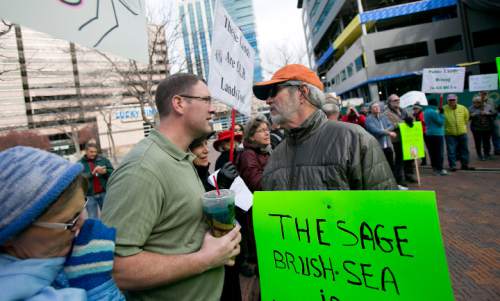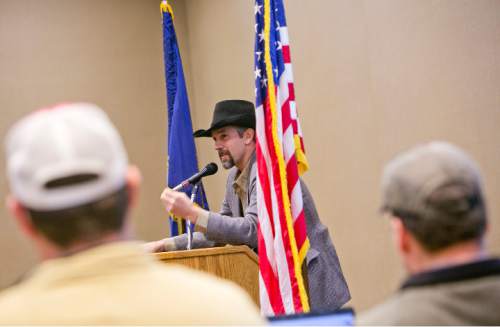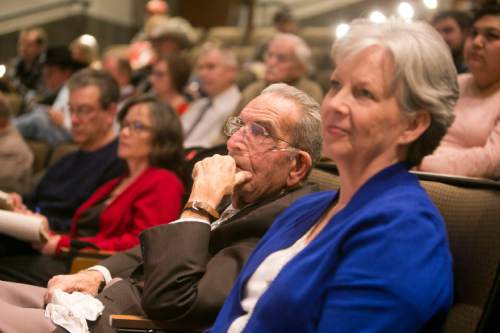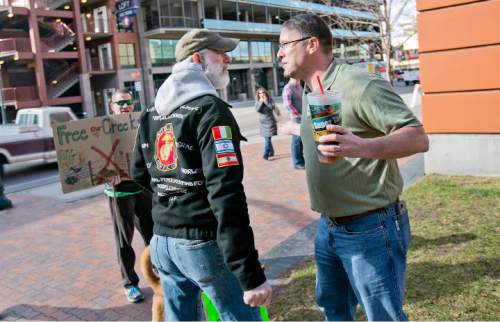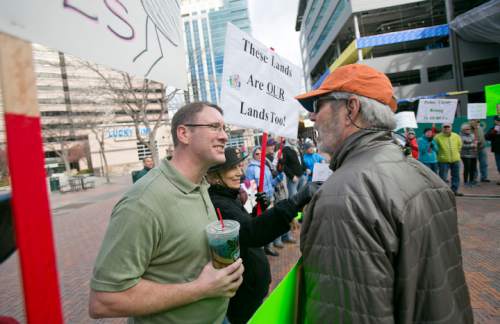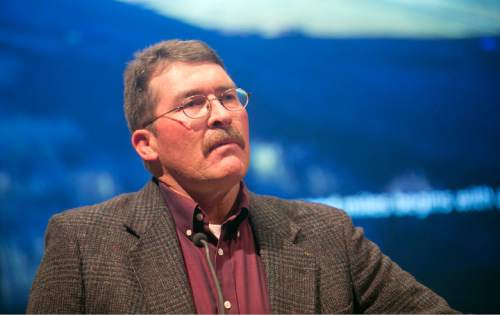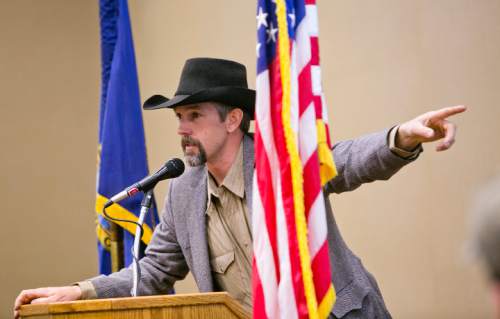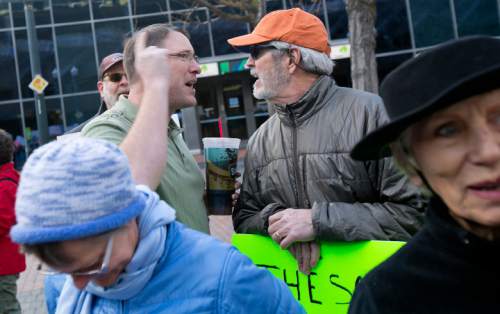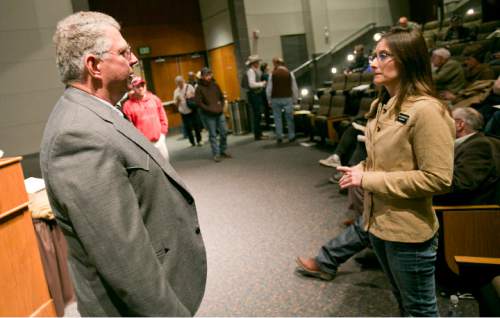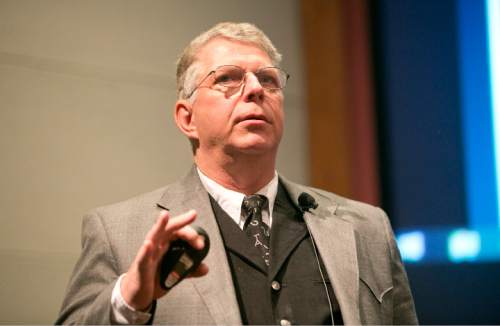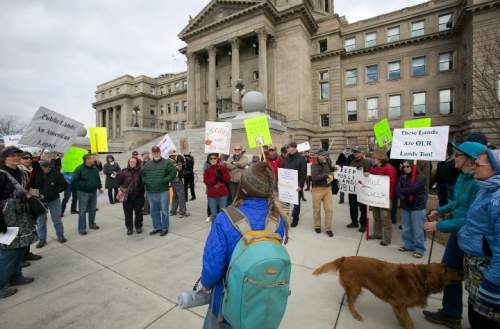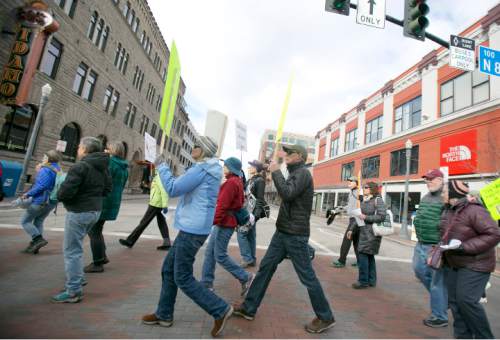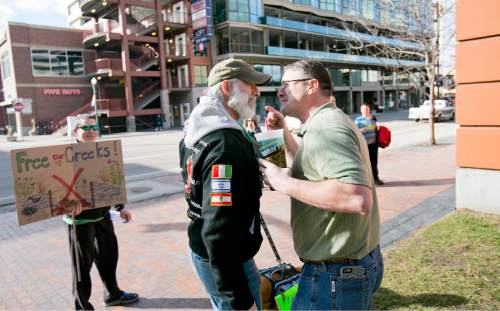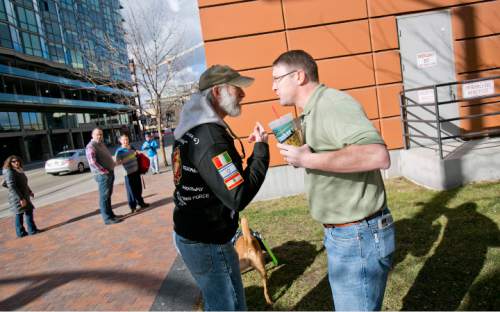This is an archived article that was published on sltrib.com in 2016, and information in the article may be outdated. It is provided only for personal research purposes and may not be reprinted.
Boise • The allotments Western ranchers use are not really public land, but rather grazing reserves to which ranchers hold a "property right" that the federal government has no authority to infringe.
Although some experts dispute such claims, that was the lesson taught Saturday at a property rights forum in Idaho organized by Utah activists sympathetic to the militants who have occupied an Oregon wildlife refuge for most of January.
"You own the forage. There's even cases where they said ranchers are entitled to compensation for the timber. This isn't something I made up. Everything in my research is based exactly on what the laws say," keynote speaker Angus McIntosh told about 60 people gathered at the Boise Centre in the heart of Idaho's capital city.
McIntosh is an adjunct professor of agriculture at Texas A&M University, where he taught an online course last year.
The Boise event, titled Storm Over Rangelands and organized by the Ogden-based National Federal Lands Conference, is a follow-up to a gathering last week in Cedar City, where several Utah ranchers agreed to disavow their contracts with the Bureau of Land Management and the U.S. Forest Service. The events address "a long trail of abuses" directed at productive land users by these agencies, according to organizer Todd Macfarlane, a Kanosh lawyer active in land-use controversies.
Supporters of Western conservation groups staged a counterprotest on the steps of the Idaho Capitol and then marched through downtown to the conference venue. About 75 protesters held signs and chanted "Keep public lands in public hands," and later sang "This Land Is Your Land," as a conference attendee entered their circle and heckled.
"We need to push back against these efforts to encourage people to break the law," said Katie Fite of Wildlands Defense, an Idaho-based conservation group. Ranchers' "permits don't have many controls, but what they do have must be followed. You can triple the number of cows if you don't think there are controls. You harm the land and the public good. It is the epitome of greed and selfishness."
The National Federal Lands Conference forums aim to provide "tools" that would enable ranchers to assert their rights in the face of federal obstruction to the lands' resources, according to Macfarlane. One tool is billed as a "notice of consent of withdrawal," a pledge ranchers are being asked to send the federal government renouncing the contracts governing their use of the land.
Some of the ranchers at Saturday's meeting seemed hesitant to take that step, which could expose them to legal headaches and possible eviction from their allotments.
Harney County rancher Charmaign Edwards agrees her family owns the grass on their massive BLM allotment and they can be trusted to manage the resource sustainably without federal interference.
"It's your livelihood. You have to take care of it," said Edwards, whose family acquired the ranch near Fields, Ore., in 1976. They used to run 650 head on the Pebble Lone Mountain allotment, but the BLM cut stocking levels by 14 percent in the 1980s and they have never been restored.
She and her husband, Nolan, do not oppose paying grazing fees, but they prefer being regulated by state and local authorities, rather than the feds, she said.
"They don't want us there. Their objective is to get us off the land. The public has to understand that the federal government is not their friend and ranchers are not their enemy. If we are off there, they are off there, too," Edwards said.
Before his Tuesday arrest, Oregon standoff leader Ammon Bundy had planned to speak at the Idaho forum. Speakers who made the trip included Nevada rancher Cliff Gardner and rancher Tim Smith, who heads the Harney County Committee of Safety, dedicated to restoring resource development in the county where the Malheur National Wildlife occupation unfolded.
Gardner said federal agencies routinely ignore information he has brought them. In the meantime, officials gave deference to conservation groups' data that exaggerated grazing impacts, and ranchers had no "due process" to challenge it.
"We ought to be screaming from the rooftops. We can't live with this federal jurisdiction. Not only is there no way to get justice in federal courts, but they are setting precedents that are leaking down to lower courts," Gardner said. "They are spreading disinformation with our money. We are too busy working to counter their disinformation."
Headliner McIntosh worked for the Forest Service and other federal agencies for 16 years. He quit federal employment in 1998 after becoming sick of agencies' hypocritical land management practices that violate ranchers' rights, according to event organizer Jon Pratt.
"It's not grazing privileges. It's rights. He is showing these are preemptive rights. You can't take away a right. By policy, what BLM and the Forest Service have done in last 40 years has gone against the law. If anyone has broken contracts it's the BLM and Forest Service," said Pratt, a Millard County resident involved with the livestock industry.
A series of statutes dating from the Homestead Act of 1862 through the Taylor Grazing Act of 1934, read in harmony with each other, confers property rights to those putting public land to beneficial use, McIntosh said.
"Cutting brush, removing stumps, poisoning ranch-destroying rodents, those improve the range. An improved range is property," he said. "The concept of occupancy, use and improvement runs through all the public land laws. … Once a right is granted it's pretty hard to take it back. The right can only be extinguished trough due process and just compensation."
Under current law, however, ranchers do not hold a right to the land's resources, but rather a permit to use them pursuant to various regulations, according to Thad Box, retired dean of Utah State University's College of Natural Resources.
"The federal agencies are essentially our hired hands, paid to manage and protect public lands that belong to all of us. Livestock grazing is a traditional, permitted use of our Western lands. A rancher who grazes animals on public lands is a permittee, not an owner of the privilege," he wrote in an email.
The now-jailed militants who staged the armed Malheur occupation claimed the land's resources must be "returned" to the ranchers, loggers, miners and others who produce food, timber and minerals. Occupation spokesman LaVoy Finicum, who was fatally shot Tuesday while evading arrest on an Oregon highway, pushed this idea during recent Utah visits imploring ranchers to take control of the land they graze.
Justifying such action is, McIntosh said, is chronic "overreach" by Forest Service and BLM officials, whom he likens to brownshirts, Hitler's paramilitary enforcers.
Conservation groups, however, believe the federal agencies routinely cave to pressure from county commissioners and give ranchers great latitude. And the watersheds suffer from the feds' failure to enforce thresholds designed to protect the environment, according to Mary O'Brien of the Grand Canyon Trust.
Ranchers "have enjoyed more use of public land than anyone else, and instead of being grateful, they think it's theirs. They are cruising along on the myth of the cowboy," she said.
Conservationists called on Utah's political leaders to condemn the campaign to get ranchers to cut off federal oversight before it incites further conflict.
U.S. Rep. Rob Bishop was not willing to go that far when asked about it Friday.
"Is it appropriate to break the law? Of course not. But I understand their frustrations," said the Utah Republican, who chairs the House Natural Resources Committee. Bishop said the conversation must focus on the behavior of federal agencies, which have shown themselves unwilling to listen to ranchers, treat them like people or, he said, make compassionate decisions on matters that affect their livelihoods.
The agencies say they already treat ranchers like partners.
"We have a commitment to collaboration. If there are issues, let's sit down and talk about them," Forest Service spokesman Wade Muehlhof said. "We do care and put a tremendous amount of effort into mitigating these issues. There is a small minority of folks we have not been able to resolve issues with, but with the majority we have good, strong relationships. This is an anomaly."
Brian Maffly covers public lands for The Salt Lake Tribune. Maffly can be reached at bmaffly@sltrib.com or 801-257-8713. Twitter: @brianmaffly


